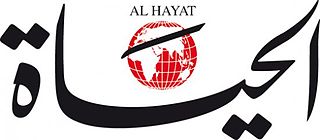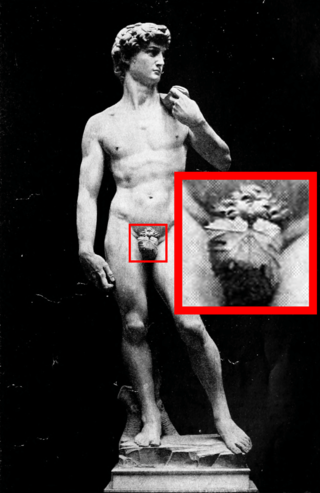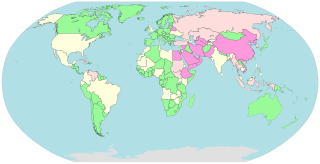Telecommunications in the United Arab Emirates (UAE) is under the control and supervision of the Telecommunications and Digital Government Regulatory Authority which was established under UAE Federal Law by Decree No. 3 of 2003. From 1976 to 2006 the Emirates Telecommunications Corporation (Etisalat) was the sole telephone and telecommunications provider for the UAE. And while there were exceptions for free zones and modern housing developments, for the majority of the UAE, Etisalat held a monopoly on business and personal telecommunications services. In February 2006, this monopoly became a duopoly when a new telephone company and Internet service provider (ISP), du, was established to offer mobile services across the UAE and Internet and TV services to some free zone areas. However, due to geographical distribution of service areas, the companies do not compete for customers and thus effectively operate as monopolies. Earlier du provided triple play services to free zone areas under the name Emirates Integrated Telecommunications Company (EITC), which is still its legal name.
Internet censorship in Australia is enforced by both the country's criminal law as well as voluntarily enacted by internet service providers. The Australian Communications and Media Authority (ACMA) has the power to enforce content restrictions on Internet content hosted within Australia, and maintain a blocklist of overseas websites which is then provided for use in filtering software. The restrictions focus primarily on child pornography, sexual violence, and other illegal activities, compiled as a result of a consumer complaints process.

Internet censorship in Pakistan is due to the governments attempts to control information sent and received using social media and the Internet in Pakistan. Presently, as of December 2024, X is banned, despite the government using the platform to issue official statements.

Al-Hayat was an Arabic newspaper based in Beirut from its founding 28 January 1946 to 1976 and in London after its refounding in 1988. It was a pan-Arab newspaper owned by Saudi Prince Khalid bin Sultan, that had a circulation estimated over 200,000. It was the newspaper of record for the Arab diaspora and the preferred venue for liberal intellectuals who wished to express themselves to a large public. Founded in 1946, the paper closed in March 2020 after years of financial problems.
Censorship in India has taken various forms throughout its history. Although de jure the Constitution of India guarantees freedom of expression, de facto there are various restrictions on content, with an official view towards "maintaining communal and religious harmony", given the history of communal tension in the nation. According to the Information Technology Rules 2011, objectionable content includes anything that "threatens the unity, integrity, defence, security or sovereignty of India, friendly relations with foreign states or public order".
Censorship in the People's Republic of China (PRC) is mandated by the country's ruling party, the Chinese Communist Party (CCP). It is one of the strictest censorship regimes in the world. The government censors content for mainly political reasons, such as curtailing political opposition, and censoring events unfavorable to the CCP, such as the 1989 Tiananmen Square protests and massacre, pro-democracy movements in China, the persecution of Uyghurs in China, human rights in Tibet, Falun Gong, pro-democracy protests in Hong Kong, and aspects of the COVID-19 pandemic. Since Xi Jinping became the general secretary of the Chinese Communist Party in 2012, censorship has been "significantly stepped up".

Al Watan is a daily newspaper in Saudi Arabia. The chairman of the newspaper is Bandar bin Khalid.

Jamal Ahmad Khashoggi was a Saudi journalist, dissident, author, columnist for Middle East Eye and The Washington Post, and a general manager and editor-in-chief of Al-Arab News Channel who was assassinated at the Saudi consulate in Istanbul on 2 October 2018 by agents of the Saudi government at the behest of Crown Prince Mohammed bin Salman.
Censorship in Myanmar results from government policies in controlling and regulating certain information, particularly on religious, ethnic, political, and moral grounds.

Internet censorship is the legal control or suppression of what can be accessed, published, or viewed on the Internet. Censorship is most often applied to specific internet domains but exceptionally may extend to all Internet resources located outside the jurisdiction of the censoring state. Internet censorship may also put restrictions on what information can be made internet accessible. Organizations providing internet access – such as schools and libraries – may choose to preclude access to material that they consider undesirable, offensive, age-inappropriate or even illegal, and regard this as ethical behavior rather than censorship. Individuals and organizations may engage in self-censorship of material they publish, for moral, religious, or business reasons, to conform to societal norms, political views, due to intimidation, or out of fear of legal or other consequences.
Censorship is a long term issue in Malaysia which has become more apparent as it attempts to adapt to a modern knowledge-based economy. Despite having in its Federal Constitution that subject to certain conditions, "every citizen has the right to freedom of speech and expression", Malaysia has consistently sat low on global indexes related to press and media freedom.
Mass media in Saudi Arabia provides unwavering support for the Mohammed bin Salman regime and routinely ignores negative reporting about the kingdom. Independent media are non-existent in Saudi Arabia. Outlets and journalists that fail to support the regime are subject to suspicion and repression.

Censorship is the suppression of speech, public communication, or other information. This may be done on the basis that such material is considered objectionable, harmful, sensitive, or "inconvenient". Censorship can be conducted by governments and private institutions. When an individual such as an author or other creator engages in censorship of their own works or speech, it is referred to as self-censorship. General censorship occurs in a variety of different media, including speech, books, music, films, and other arts, the press, radio, television, and the Internet for a variety of claimed reasons including national security, to control obscenity, pornography, and hate speech, to protect children or other vulnerable groups, to promote or restrict political or religious views, and to prevent slander and libel. Specific rules and regulations regarding censorship vary between legal jurisdictions and/or private organizations.

Wikipedia has been censored by governments that occurred widely in countries including China, Iran, Myanmar, Pakistan, Russia, Saudi Arabia, Syria, Tunisia, Turkey, Uzbekistan, and Venezuela. Some instances are examples of widespread Internet censorship in general that includes Wikipedia content. Others are indicative of measures to prevent the viewing of specific content deemed offensive. The duration of different blocks has varied from hours to years.
There is medium internet censorship in France, including limited filtering of child pornography, laws against websites that promote terrorism or racial hatred, and attempts to protect copyright. The "Freedom on the Net" report by Freedom House has consistently listed France as a country with Internet freedom. Its global ranking was 6 in 2013 and 12 in 2017. A sharp decline in its score, second only to Libya was noted in 2015 and attributed to "problematic policies adopted in the aftermath of the Charlie Hebdo terrorist attack, such as restrictions on content that could be seen as 'apology for terrorism,' prosecutions of users, and significantly increased surveillance."

Okaz is an Arabic Saudi Arabian daily newspaper located in Jeddah. The paper was launched in 1960 and its sister publication is Saudi Gazette. The paper is simultaneously printed in both Riyadh and Jeddah and has offices all over Saudi Arabia. However, the daily mainly serves the provinces of the Hejaz and Asir. As of 2012 Abdullah Saleh Kamel was the chairman of the board of directors of the Okaz Organization for Press and Publication. Lawrence Wright of The New Yorker states that Okaz is "like an Arabic version" of the New York Post.
Censorship is a policy used by governments to retain control over their people by preventing the public from viewing information considered by the republic as holding the potential to incite a rebellion. The majority of nations in the Middle East censor the media, including Bahrain, Egypt, Iran, Saudi Arabia, Syria, Turkey and the United Arab Emirates.
In the Philippines, censorship involves the control of certain information.

The Riyadh International Book Fair (RIBF) is an annual book fair in Saudi Arabia. It lasts 11 days and regularly attracts over a half million visitors. The fair is used to showcase Saudi government policy, and it has been a locus of political power struggles with the government. Hundreds of publishers sell pre-approved books, and some black-market books. Writers take part in literary events. Invited speakers and the public discuss intellectual and social issues. Disagreements sometimes go beyond the bounds of debate, with speakers being shouted down and surrounded by protestors, and arrests of speakers and protestors; physical assaults are rare but not unknown.

This list of Internet censorship and surveillance in Asia provides information on the types and levels of Internet censorship and surveillance that is occurring in countries in Asia.













